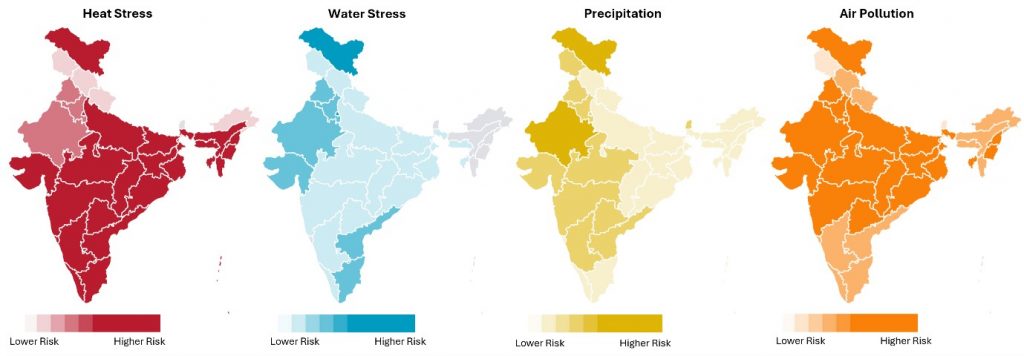September 19, 2024, by lzzre
Protecting worker welfare through climate change training
Dr Bethany Jackson
Climate change is an increasing threat to working conditions. Some of the most vulnerable workers globally are facing risks of environmental extremes and economic exploitation.
To support organisations developing strategies to improve worker welfare in India we have designed and made freely available an online self-guided training module on the topic of climate change and working conditions in India’s brick kiln manufacturing sector. Building on successful mapping of the brick kiln industry using satellite data, and these data being applied to a survey mapping mechanism (the GeoAI App), we are now combining environmental data to further understand – and ultimately improve – working conditions.
Using climate modelling data, four key climate change impacts are modelled at the state level and the impacts can be assessed at various climate change model parameters (from 1.5, 2 and 3 degrees Celsius of warming) and three social-pathways. These risks include heat stress, water stress, precipitation, and air pollution. All impacts are present in India, but they are more extreme in some locations than others, which will mean different impacts for workers in the kilns.

Risks of the four climate hazards faced by kiln workers and their distribution across India based on the climate modelling used for the training module. All regions have risk, but in some it is larger than others.
Protecting the welfare of workers is paramount. Kiln workers often face dual risks of climate change risks whilst they work contributing to poor working conditions, as well as economic and social risks. For example, bonded labour – where a worker is bound to an employer through debts – is common in the kilns and can lead to lack of choices. Climate change is also leading to concerns of debt exacerbation as workers must adapt to more extreme weather, rather than being supported by the kiln owners.
Those on the ground working with inspectorates and civil society organisations (CSOs) educating and assisting kiln workers required methods to understand the impacts and actionable recommendations. This is why we developed the “Environmental Impacts Training Module: Assessing Risks to Workers in India” to outline the risks workers across the kiln industry might be facing, how this is likely to impact working conditions, and provide recommendations to assist multiple groups (workers themselves, kiln owners, CSOs, and policymakers).
The module is currently available in English, but we will be producing alternative language versions in the future to expand the access of the toolkit and its training ability. Further, we know that the brick kiln industry expands further than just India and, in the future, addressing the environmental impacts on workers in other geographies.
We also know that the kiln sector is seasonal, and the working population is often migratory, and thus potentially exposed to spatial variations in climate change impacts during their work in the months between April and October when kiln work is unavailable. Seeking to assess these impacts may shed light on why bondage is more likely in the kilns and how working patterns may shift in a changing climate; ultimately helping workers access support and CSOs/governments to more directly target their interventions.
By engaging with the training module, we hope to share the knowledge we have accumulated on kilns and their working conditions to a wide audience and provide actionable recommendations to improve worker welfare in the long-term.
No comments yet, fill out a comment to be the first

Leave a Reply